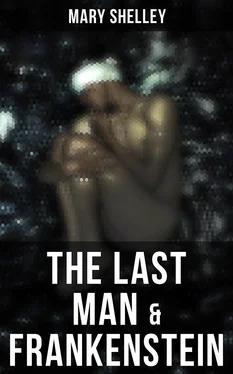Such was our domestic circle, from which care and pain seemed for ever banished. My father directed our studies, and my mother partook of our enjoyments. Neither of us possessed the slightest pre-eminence over the other; the voice of command was never heard amongst us; but mutual affection engaged us all to comply with and obey the slightest desire of each other.
Table of Contents
When I had attained the age of seventeen, my parents resolved that I should become a student at the university of Ingolstadt. I had hitherto attended the schools of Geneva; but my father thought it necessary, for the completion of my education, that I should be made acquainted with other customs than those of my native country. My departure was therefore fixed at an early date; but, before the day resolved upon could arrive, the first misfortune of my life occurred – an omen, as it were, of my future misery.
Elizabeth had caught the scarlet fever; but her illness was not severe, and she quickly recovered. During her confinement, many arguments had been urged to persuade my mother to refrain from attending upon her. She had, at first, yielded to our entreaties; but when she heard that her favourite was recovering, she could no longer debar herself from her society, and entered her chamber long before the danger of infection was past. The consequences of this imprudence were fatal. On the third day my mother sickened; her fever was very malignant, and the looks of her attendants prognosticated the worst event. On her death-bed the fortitude and benignity of this admirable woman did not desert her. She joined the hands of Elizabeth and myself: “My children,” she said, “my firmest hopes of future happiness were placed on the prospect of your union. This expectation will now be the consolation of your father. Elizabeth, my love, you must supply my place to your younger cousins. Alas! I regret that I am taken from you; and, happy and beloved as I have been, is it not hard to quit you all? But these are not thoughts befitting me; I will endeavour to resign myself cheerfully to death, and will indulge a hope of meeting you in another world.”
She died calmly; and her countenance expressed affection even in death. I need not describe the feelings of those whose dearest ties are rent by that most irreparable evil, the void that presents itself to the soul, and the despair that is exhibited on the countenance. It is so long before the mind can persuade itself that she, whom we saw every day, and whose very existence appeared a part of our own, can have departed for ever – that the brightness of a beloved eye can have been extinguished, and the sound of a voice so familiar, and dear to the ear, can be hushed, never more to be heard. These are the reflections of the first days; but when the lapse of time proves the reality of the evil, then the actual bitterness of grief commences. Yet from whom has not that rude hand rent away some dear connexion; and why should I describe a sorrow which all have felt, and must feel? The time at length arrives, when grief is rather an indulgence than a necessity; and the smile that plays upon the lips, although it may be deemed a sacrilege, is not banished. My mother was dead, but we had still duties which we ought to perform; we must continue our course with the rest, and learn to think ourselves fortunate, whilst one remains whom the spoiler has not seized.
My journey to Ingolstadt, which had been deferred by these events, was now again determined upon. I obtained from my father a respite of some weeks. This period was spent sadly; my mother’s death, and my speedy departure, depressed our spirits; but Elizabeth endeavoured to renew the spirit of cheerfulness in our little society. Since the death of her aunt, her mind had acquired new firmness and vigour. She determined to fulfil her duties with the greatest exactness; and she felt that that most imperious duty, of rendering her uncle and cousins happy, had devolved upon her. She consoled me, amused her uncle, instructed my brothers; and I never beheld her so enchanting as at this time, when she was continually endeavouring to contribute to the happiness of others, entirely forgetful of herself.
The day of my departure at length arrived. I had taken leave of all my friends, excepting Clerval, who spent the last evening with us. He bitterly lamented that he was unable to accompany me: but his father could not be persuaded to part with him, intending that he should become a partner with him in business, in compliance with his favourite theory, that learning was superfluous in the commerce of ordinary life. Henry had a refined mind; he had no desire to be idle, and was well pleased to become his father’s partner, but he believed that a man might be a very good trader, and yet possess a cultivated understanding.
We sat late, listening to his complaints, and making many little arrangements for the future. The next morning early I departed. Tears guished from the eyes of Elizabeth; they proceeded partly from sorrow at my departure, and partly because she reflected that the same journey was to have taken place three months before, when a mother’s blessing would have accompanied me.
I threw myself into the chaise that was to convey me away, and indulged in the most melancholy reflections. I, who had ever been surrounded by amiable companions, continually engaged in endeavouring to bestow mutual pleasure, I was now alone. In the university, whither I was going, I must form my own friends, and be my own protector. My life had hitherto been remarkably secluded and domestic; and this had given me invincible repugnance to new countenances. I loved my brothers, Elizabeth, and Clerval these were “old familiar faces”; but I believed myself totally unfitted for the company of strangers. Such were my reflections as I commenced my journey; but as I proceeded, my spirits and hopes rose. I ardently desired the acquisition of knowledge. I had often, when at home, thought it hard to remain during my youth cooped up in one place, and had longed to enter the world, and take my station among other human beings. Now my desires were complied with, and it would, indeed, have been folly to repent.
I had sufficient leisure for these and many other reflections during my journey to Ingolstadt, which was long and fatiguing. At length the high white steeple of the town met my eyes. I alighted, and was conducted to my solitary apartment, to spend the evening as I pleased.
The next morning I delivered my letters of introduction, and paid a visit to some of the principal professors, and among others to M. Krempe, professor of natural philosophy. He received me with politeness, and asked me several questions concerning my progress in the different branches of science appertaining to natural philosophy. I mentioned, it is true, with fear and trembling, the only authors I had ever read upon those subjects. The professor stared: “Have you,” he said, “really spent your time in studying such nonsense?”
I replied in the affirmative. “Every minute,” continued M. Krempe with warmth, “every instant that you have wasted on those books is utterly and entirely lost. You have burdened your memory with exploded systems, and useless names. Good God! in what desert land have you lived, where no one was kind enough to inform you that these fancies, which you have so greedily imbibed, are a thousand years old, and as musty as they are ancient? I little expected in this enlightened and scientific age to find a disciple of Albertus Magnus and Paracelsus. My dear Sir, you must begin your studies entirely anew.”
So saying, he stept aside, and wrote down a list of several books treating of natural philosophy, which he desired me to procure, and dismissed me, after mentioning that in the beginning of the following week he intended to commence a course of lectures upon natural philosophy in its general relations, and that M. Waldman, a fellow-professor, would lecture upon chemistry the alternate days that he missed.
Читать дальше












